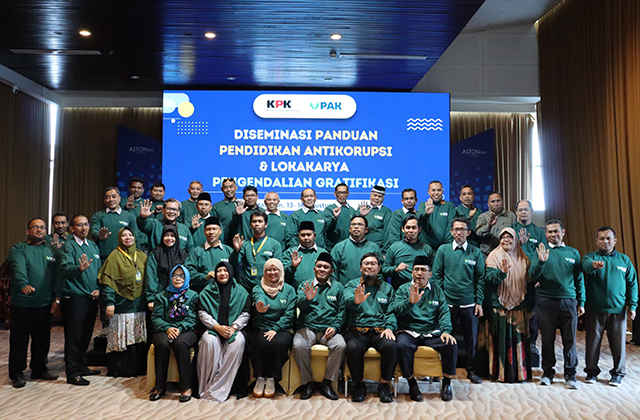Unram Involves in Dissemination of Anticorruption Education Implementation Guidelines and Workshop on Gratification Control Program

Mataram, University of Mataram – In order to strengthen the implementation of Anti-Corruption Education (ACE) in higher education, the Corruption Eradication Commission (KPK) conducted the Dissemination of Anti-Corruption Education Implementation Guidelines and Gratification Control Program Workshop. This activity was held for two days, on August 13-14, 2024, at the Aston Inn Mataram Hotel.
This activity is part of the National Strategy and Implementation Guidelines for Anticorruption Education prepared by the KPK to encourage strengthening integrity in the ecosystem of State Universities (PTN) and State Religious Universities (PTKN). University of Mataram (Unram) and State Islamic University (UIN) Mataram were selected as mentoring campuses in the Strengthening the Integrity of State University Ecosystem (PIEPTN) program.
This dissemination and workshop was attended by 20 representatives from various elements in Unram. Starting from the Rector, Vice Rectors, Head of Bureau, Head of PIEPTN Coordinator / Head of SPI, Head of Institution, Head of Work Team, to Lecturers of MKWK / Anti-Corruption Education.
This activity aims to provide in-depth knowledge about anti-corruption education implementation guidelines and develop more specific action plans related to gratification control programs in the campus environment.
On this occasion, KPK together with Unram committed to continue to increase awareness and real action in preventing corruption.
One of the speakers in this activity was Muhammad Indra Furqon, Widyaiswara KPK RI who gave material on “Building Integrity and Antigratification Culture”. In his presentation, he discussed gratuities from various perspectives.
“How dangerous this gratification is, because often gifts that are considered trivial turn out to be gratuities. Gratification is broad, all things related to our positions and responsibilities are related to gratification,” he explained.
Through this explanation, Indra emphasized the importance of a deep understanding of gratuities so that all parties can be more aware of the potential risks that may arise. The discussion aimed to strengthen the antigratification culture in higher education and help participants understand ways to prevent and address gratification issues in their surroundings.
In other sessions, participants also received practical guidance on implementing effective anti-corruption education and gratification control strategies. Participants were encouraged to develop specific and measurable action plans to improve integrity on their campuses.
